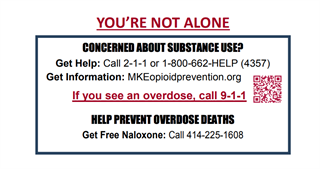Fast Facts about the Opioid Crisis in Southeastern Wisconsin

March 20, 2018
Written by Lauren Widor, volunteer blogger
Opioids, like heroin and fentanyl, are not only rampant across the nation, they’re also taking lives in our community. In 2017, opioid overdoses accounted for over 300 deaths in Milwaukee and over 40 in Waukesha. According to the Medical College of Wisconsin, there has been a 495 percent increase in heroin-related deaths in Milwaukee since 2005.
Community members, activists, and professionals are fighting hard to end the epidemic in Milwaukee and Waukesha. Groups like The Ozaukee County Heroin Task Force have members from law enforcement and healthcare professionals working together to take preventative action on the opioid epidemic. Other groups like the Milwaukee County Substance Abuse Prevention Coalition spend their time educating area youth on drug use, specifically targeting the abuse of prescription pills.
The over-prescribing of opiates by doctors has greatly attributed to our nation’s heroin epidemic. According to the National Institute on Drug Abuse, nearly 80 percent of heroin users reported using prescription opiates prior to heroin. In Wisconsin, state legislature adopted the Prescription Drug Monitoring Program which provides information about controlled substances to doctors, hoping to limit the over-prescribing of opioids like oxycodone, morphine, and hydrocodone to patients. Still, in 2017, 433,815 controlled substances, which include narcotics, opioids, and benzodiazepines, were dispensed across the state.
United Way of Greater Milwaukee & Waukesha hopes to help our community put an end to the epidemic that is tearing families apart. United Way held training sessions with agencies on how to administer Naloxone, an antidote to opioids. The city of Waukesha holds Naloxone trainings for anyone interested to use in case of an emergency. Also, you can contact the Milwaukee Opioid Overdose Prevention Effort as they offer free Naloxone for anyone in need:

For those seeking help, United Way agency program partner Meta House is a residential treatment program for women that allows children to live with their mothers during their recovery. Meta House was one of the first treatment facilities in the nation to provide mothers and their children (up to 10 years old) a place where they can heal together.
Meta house is one of many available treatment facilities, and services like IMPACT 2-1-1 (simply dial 211 *** or text your zip code to 898-211*** from your phone) can help identify an appropriate, local treatment resource. IMPACT can identify appropriate resources to help regain stability. Not all resources are for treatment, and treatment is not appropriate in all cases. Please contact me at (414)256-4808 if you have any questions or concerns. I'd be happy to help with future articles about IMPACT's services, including IMPACT 2-1-1.
During this epidemic, it is extremely important to be aware of what is happening in your community, your school, your neighborhood, and even your home. You can help by getting rid of any unused prescription drugs in the house. There are a number of drug take back locations in Wisconsin, including police departments and community drug take back events. To find the nearest unused prescription drug drop off near you, visit doseofrealitywi.gov or click here.
You can also do your part by getting involved by volunteering at an organization like COPE Services or attending meetings with any of the organizations mentioned in this article.
Learn more about United Way’s work in this space through the Opioid Abuse Treatment & Prevention Initiative.
 Lauren Widor is a writer based in the midwest. She's a human rights advocate and a parent to three rescue pets.
Lauren Widor is a writer based in the midwest. She's a human rights advocate and a parent to three rescue pets.

Have something to say? LEAVE A COMMENT:
Your email address will not be published. All fields Required.
United Way of Greater Milwaukee & Waukehsa County blog and social media presence is designed as a source for information, sharing and collaboration about United Way and health and human service related topics. As part of our commitment to our readers, we expect all posters to abide by the following rules:
• Posts and comments should be on topic, conversational, and serve to educate or entertain
• Posts and comments may not be unlawful, fraudulent, threatening, libelous, defamatory, discriminatory, harassing, obscene or otherwise rude or in poor taste
• Posts and comments may not be used for any commercial purpose or otherwise to promote any outside organization or its activities
United Way of Greater Milwaukee & Waukesha County reserves the right, at our discretion, to remove any post or to revoke a user’s privilege to post to our page. Comments found to be in conflict with the guidelines above will be removed promptly.
Comments are not necessarily those of United Way of Greater Milwaukee & Waukesha County and its employees and we do not guarantee the accuracy of these posts.